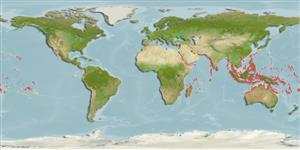Common names from other countries
Environment: milieu / climate zone / depth range / distribution range
Ecologia
marinhas; Água doce; estuarina demersal; anfídromo (Ref. 51243); intervalo de profundidade 0 - 5 m (Ref. 86942). Tropical; 25°C - ? (Ref. 2059); 45°N - 27°S
Indo-West Pacific: throughout the Indo-Pacific, from east African coasts to Philippines, Melanesia and Polynesia (Ref. 6802); east African coast south to Transkei (Ref. 52193).
Tamanho / Peso / Idade
Maturity: Lm ? range ? - ? cm
Max length : 26.0 cm TL macho/indeterminado; (Ref. 5493)
Espinhos dorsais (total) : 7; Raios dorsais (total) : 8; Espinhos anais: 1; Raios anais : 8. Diagnosis: Longitudinal line scales 57-68; preopercular spine present; 8-10 gillrakers on lower part of first branchial arch (Ref. 5493, 79840). Dark brown to black in color; horizontal lines on body; young with spotted fins (Ref. 5493).
Adults inhabit lagoons, estuaries and freshwater (Ref. 6028, 48637, 79840). They occur in the lower reaches of freshwater streams, usually on mud bottoms (Ref. 44894). Juveniles are found mainly among mangrove roots in the more saline areas of lagoons and estuaries (Ref. 6028, 79840). Carnivorous (Ref. 79840). Marketed fresh (Ref. 12693).
Ciclo de vida ou comportamento de acasalamento
Maturities | Reprodução | Spawnings | Egg(s) | Fecundities | Larvas
Spawns eggs on submerged plants with small leaves. Female tends and fans the eggs until hatching and loosely guards the fry for a few days thereafter.
Maugé, L.A., 1986. Eleotridae. p. 389-398. In J. Daget, J.-P. Gosse and D.F.E. Thys van den Audenaerde (eds.) Check-list of the freshwater fishes of Africa (CLOFFA). ISNB, Brussels; MARC, Tervuren; and ORSTOM, Paris. Vol. 2. (Ref. 6802)
Status na Lista Vermelha da UICN (Ref. 130435)
CITES (Ref. 128078)
Not Evaluated
Ameaça para os humanos
Harmless
Uso pelos humanos
Pescarias: pouco comercial; Aquário: Espécies comerciais
Ferramentas
Relatórios especiais
Baixar XML
Fontes da internet
Estimates based on models
Preferred temperature (Ref.
115969): 25.4 - 29.3, mean 28.5 (based on 3082 cells).
Índice de diversidade filogenética (Ref.
82804): PD
50 = 0.5000 [Uniqueness, from 0.5 = low to 2.0 = high].
Nível Trófico (Ref.
69278): 3.8 ±0.3 se; based on diet studies.
Resiliência (Ref.
120179): médio(a), tempo mínimo de duplicação da população 1,4 - 4,4 anos (Preliminary K or Fecundity.).
Fishing Vulnerability (Ref.
59153): Low vulnerability (16 of 100).
